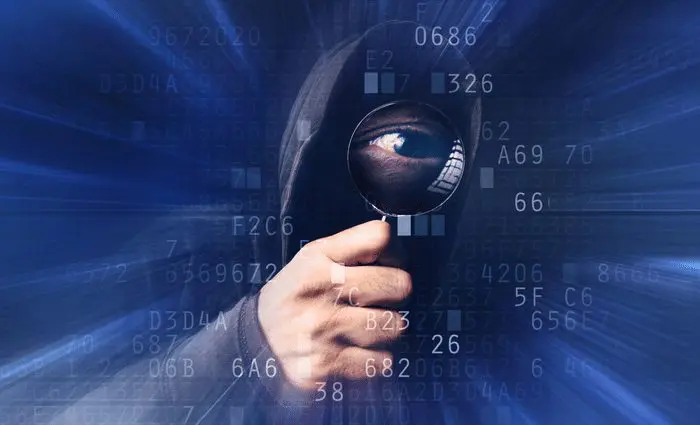You shouldn’t assume no one is observing you even though you’re lonely in your bedroom perusing the internet. And over 90% of devices worldwide have some kind of spyware installed without their owners’ knowledge. Hackers may access your private data and then utilize it to acquire your cash, files, and sometimes even your personality with the usages of this computer viruses.
What is Spyware?
Spyware is something of a harmful program that infects machines and other gadgets linked to the network and discreetly logs your online surfing patterns, the webpages you browse, and your transactions.
Some spyware varieties also keep track of your payment information, login information, and keys. The creator of the spyware will then get this information and have the option of using it for private benefit or selling it over to a 3rd entity.
Spyware is loaded on your system without your knowledge, much like other dangerous software. Typically, it comes with reputable apps that you consciously acquired.
However, browsing malicious web pages or opening links and files in contaminated emails might potentially unintentionally obtain it. Spyware can connect to the computer device as quickly as you load it and begin functioning stealthily in the backdrop.
Spyware was first used in the middle of the nineties, although the program was there much before. Initially, programmers would include a spyware feature in their creations to monitor user activity.
With these statistics in hand, they may then contact prospective marketers or employ them to look for any unauthorized software use. But by the earlier 2000s, over 90% of all computer owners had spyware that had been secretly placed without their knowledge on their computers.
There are various spyware products available nowadays, some of which are even included with gear. Instead of focusing on specific users, spyware developers try to collect as much information as they can to offer to marketers, spammers, con artists, or attackers.
Nobody is protected from spyware because new types of malicious programs are now being published every few minutes. When you approved its EULA, you gave those businesses permission to employ spyware to monitor your activities.
Types Of Spyware
The following 5 categories may be used to classify all types involving spyware:
1. Infostealers.
Infostealers are viruses that may search infected machines for private details and acquire them, as its name implies. Logins, credentials, email accounts, personal papers, and media assets may all be included in this data. Info thieves may locally or remotely retain the information they gather for future retrieval, based on the application.
Info thieves often use security flaws in browsers to their advantage to get your personal information. They occasionally also add additional fields to online forms using so-called insertion scripts.
Rather than proceeding to the webmaster when you enter the needed information and click “Submit,” the data will travel straight to the attacker, who may utilize it to assume your identity online.
2. Password thieves
The sole distinction between password stealers and infostealers is that the former are created specifically to capture login details from compromised machines. These bits of malware, which were first discovered in 2012, don’t really intercept your keys as you input them.
Rather, they adhere spyware to your computer and steal all of your stored login information. They may also keep a record of your computer login information.
Comprehensive cybersecurity software consistently removes the majority of password thieves, but some yet manage to elude detection by altering their document hashes upon each attempt.
Similar to information thieves, password thieves have the option of storing the information they have obtained in a secret document on your computer’s hard disk or even on a distant server.
3. Keyloggers.
Keylogging software, often known as system trackers or spyware, is malicious applications that keep track of the keystrokes entered on a keypad that is linked to any infected machine. Software-based keystrokes loggers periodically take snapshots of the open windows, unlike hardware-based spyware that records every input in instantaneously.
This then gives them the ability to record browsing histories, internet, and social networking communications, internet history, credit card information, credentials (when they’re not secured on-screen), as well as engine history.
Though keyloggers are often employed by attackers to steal private information from unaware targets, they have recently developed more useful applications. For example, some company owners use them to keep tabs on their workers’ online behavior, while worried guardians may place these on their kids’ laptops to protect them from harm online.
Keylogging software has also been used by several law enforcement organizations in the Usa to apprehend infamous criminals and bust drug traffickers.
4. Trojans for banks.
Banker Trojans seem to be computer programs intended to gain entrance to and capture confidential data which is either kept on or used by internet transactions.
Banker Trojans may alter website pages on internet banking sites, change the prices of activities, or even add more purchases to assist the hackers who are controlling them. They are often camouflaged as legal applications. Banker Trojans, just like other varieties of spyware, are usually designed with a doorway that enables them to communicate all the information they gather to a distant server.
These initiatives often target financial organizations, such as banks, brokerage firms, online financial firms, and suppliers of electronic wallets. Banking Trojans may frequently be undetectable even by certain financial organizations’ cutting-edge security measures because of their intricate nature.
5. Modem snoopers.
Modem hijackers are a relic of the old because to the decade-long transition from dial-up into broadband. These spyware attacks on users as they were surfing the web are possibly the earliest.
Typically, a pop-up advertisement would show up and invite the consumer to interact with it. Once they responded, a program that took possession of its dial-up connection would begin to silently download.
Once within the control of the machine, the modem thief would link the phone system to a global network rather than the localized one it was already using.
The majority of hackers would use high-end phone lines that were licensed in nations like China or Russia, and other South American nations that had minimal cybercrime laws. Typically, the victims wouldn’t realize there was an issue until they received a $1,000+ subscription fee beginning the following month.
Real-life Spyware Examples
Many spyware applications have vanished with the advancement of cybersecurity solutions throughout time, while others that are more advanced have developed. The below are among the greatest instances of spyware:
- Cool Web Search – That application can hijack Internet Browsers, modify its preferences, and transmit surfing information to its creator by taking advantage of privacy flaws in the browsers.
- Gator – Usually included within file-sharing programs like Kazaa, that application would track the victim’s online activities and utilize that data to provide more relevant advertisements to them.
- Internet Booster– This application, which was particularly well-liked during the dial-up era, claimed to expedite internet connections. Rather, it would substitute adverts for all warning and password pages.
- TIBS Dialer: It’s a modem hacker that would detach the victim’s PC from a landline and link user to another toll number intended for visiting pornographic websites.
- Zlob– sometimes referred to as just the Zlob Virus, is malware that downloads itself into a computer using flaws inside the ActiveX codecs and records inputs and also searches, and browsing history.
Effects Of Spyware
If you have been infected with spyware, it may be quite harmful. Mild discomfort to long-term economic damage is all possible threats. Here are a few of these issues that are most typical:
1. Identity forgery and data stealing.
Spyware may initially—and probably most importantly—steal private data which can be exploited for identity fraud. Malicious software may gather more than adequate information to impersonate you when it has accessibility to every bit of data on your machine.
This includes browser history, email addresses, and passwords stored for social media platforms, online purchasing, and banking. Additionally, if you’ve used internet banking services, spyware may have stolen your bank login or payment card information, which it may have then sold to or otherwise used.
2. Damages to computers.
You will increasingly experience the harm that malware might cause to your device. Poorly constructed spyware may have a negative impact on system efficiency. The memory, processor capacity, and bandwidth utilization used by your computer might be significantly increased if performance optimization is not implemented.
As a consequence, infected devices could lag and operate poorly when online or switching between programs. The worst scenarios involve your computer’s excessive heat or experiencing frequent system crashes that result in irreparable harm. Some malware even has the ability to turn off your online security tools.
3. Your surfing experience will be interrupted.
Additionally, spyware may fudge search engine outcomes and force unwanted websites into your browsers, which may take you to malicious or counterfeit websites.
It may even modify several of your device’s settings and cause your home screen to modify. A similarly annoying problem that comes with various spyware kinds is pop-up ads. Even while offline, commercials may still show up, causing inevitable annoyances.
4. Preventive measures for spyware protection.
Preventing malware from ever entering your device is the safest approach to managing it. It’s not always possible to stay away from email documents and software downloads, though. Even a reliable website may sometimes be hacked and contaminate your PC.
Look for internet security programs with dependable antivirus and antispyware detection features as your initial line of protection. Verify whether they have preventative security there too.
Many security companies provide antispyware software to help you find and get rid of adware if your machine is already affected. When selecting a Spyware elimination program, be careful to utilize a reputable internet security supplier. Certain tools may be malicious and include spyware.
Numerous antivirus programs are accessible for free. Whereas a complimentary virus protection demo is a great method to determine which program is right for your, you shouldn’t depend on a service that guarantees limitless free coverage.
They usually lack crucial characteristics that are important for preventing malware scams. Risks may be reduced with the use of tools such as a digital encrypted keypad for inputting financial data or a powerful anti-spam filtration and cloud-based surveillance system.
Don’t automatically accept cookies. Despite GDPR compliance sweeping the web, almost every website now requests your consent to set cookies. Allow cookies mostly from reputable websites and especially if you really want the provided customized experience.
Add a browser add-on that prevents tracking. There are now tools available that can let you stop being constantly tracked online. These technologies assist you in maintaining your privacy online since even trustworthy surveillance may be undesired.
Ensure that all software is up to date and secure. Os and application vulnerabilities may let malware into your device and cause it to become infected. Always upgrade as early as feasible since updates often contain security fixes to address these inherent issues.
Keep in mind that even “free” technology has a price. Free might sometimes signify a brief trial, this may often mean the author is making money off of your information. Carefully study the application license’s conditions of use before agreeing, and only consent if you want.
Final Thoughts
The first sign that espionage has been installed on a computer is usually a noticeably slower computer or network connectivity, as well as — mostly in instance of cellular devices — a notable increase in bandwidth usage or a decrease in battery capacity.
Spyware may be stopped or eliminated with antispyware programs. They may either run scans to find and get rid of spyware that is currently on a machine, or they might offer real-time security by checking network communications and blocking dangerous data.




